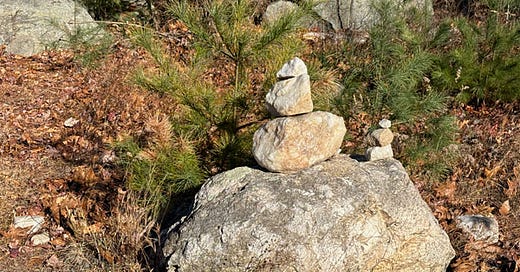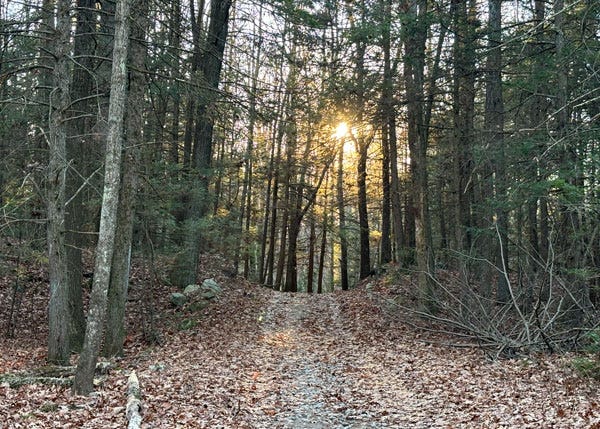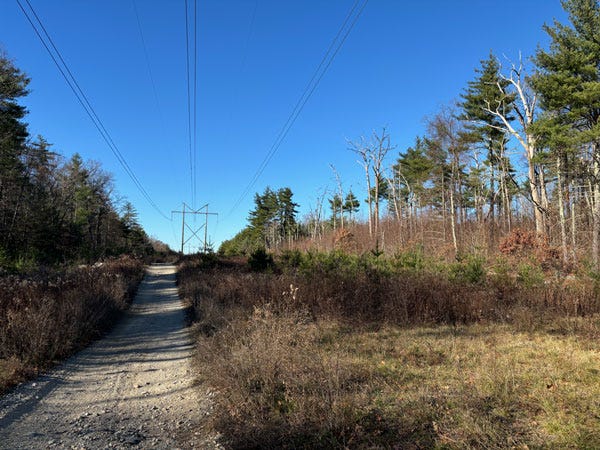Wednesday Walk: The Intelligence of Other Humans
Going on a hike with help and Black Friday thoughts
Welcome to Willoughby Hills!
Every Wednesday, I offer a few short ideas that I hope will inspire you to do some more reading, thinking, and exploring. Let’s take a little walk together and see where the path leads…
Being Neighborly
This past weekend, my son and I decided to go for a hike to explore the more than 1,000 acre nature preserve in our neighborhood. The area has some fairly clear trails, but none of them are marked and there are few if any maps available which show what leads to where.
Our neighbor is both an avid hiker and mountain biker and was the one who encouraged us to explore the woods more, saying there’s even a high lookout point where on a clear day, there are views all the way to Hartford.
We have tried a few times to navigate the woods after hearing about this lookout, but could never quite figure out the best way to get there. Again, there are no marked trails and no maps, so finding the high point seems to be a combination of luck and intuition.
My neighbor recently gave us another clue though- he sent me a text message where he said to go to where the power lines are (there’s a series of high tension wires that runs through the preserve) and make a right at pole 29.
When my son and I hiked to where the power lines were, the poles started at number 37, with each pole spaced maybe 200-300 yards apart. It took some doing, but we eventually made it to the right pole and found a small dirt path veering off into the woods.
As if our neighbor’s clue wasn’t enough, at the head of this smaller dirt trail was a series of stacked stones, as though other hikers were trying to send us a message that we were on the right path.
We went into the woods, but ultimately were still unsuccessful at making it to the top of the lookout. We had been hiking for more than an hour and hadn’t brought water, so it was time to turn back.
The entire lesson of these hikes have shown me the importance of the interdependence of humans. Were it not for our neighbor, we wouldn’t have even realized that the woods had any kind of lookout. He also helped provide us with some vague navigation advice, but only enough that we still had to rely on our own intuition.
Beyond that, the stone sculptures seemed to be communication from other hikers to keep following that path. Those other hikers may have been on this road a week ago, a month ago, or a year ago, but their message from another time reached us this past weekend and helped us find our way.
It’s easy to get caught up in our own egos and think that we can do everything on our own. Modern technology like GPS helps with some of that, although of course people built the GPS systems, maps, phones we use to access all of it, etc. Still, because we don’t see those programmers and engineers, it’s easy to ignore them.
The truth is, every human enterprise builds upon the knowledge, trials, and errors of the past. We are not all that much smarter today than we were 100 years ago or 1,000 years ago. What we have is the advantage of accumulated and recorded knowledge.
If the weather stays nice, it’s our hope that we can make it back into the woods soon and with the clues from our neighbor and our fellow humans, finally find what we’ve been seeking.
Rejecting Black Friday
I remember as a teenager both working and queuing up for Black Friday deals. Back then, it was a singular day with just a few hours worth of deals the morning after Thanksgiving. Two years ago, I shared a story about what it was like working the early shift at Toys R Us on Black Friday (which we called “Green Friday” back then because it hadn’t been branded in the national media and we raked in so much cash in the era before credit cards were so common).
It seems that Black Friday is no longer a single day or morning, but has become a weeks long event.
Ever since dropping my Amazon Prime subscription a few months ago, I have been more thoughtful about only purchasing what I need, but I understand the temptation is still sometimes there for getting a good deal.
My take on Black Friday is this: if something that you’ve been planning to purchase for a while goes on sale, by all means pick it up. Also look for deals on experiences, like memberships to museums or passes to amusement parks.
But please, don’t feed the temptation to buy stuff for stuff’s sake, regardless of the price. Or maybe especially because of the price.
Here’s some advice from Amelia Pang, author of Made in China, who I interviewed on the podcast a few years ago about questions you should ask yourself before buying something new:
1. Do I already own something that serves the same purpose?
2. Is this item so much better that I would feel compelled to donate three things in its place?
3. If it were more expensive, would I still try to figure out a way to afford it? Or am I feeling an urge to buy this only because it’s extremely cheap?
4. If the product I’m considering is an updated version of one that I already own, is my current one working just fine?
5. Am I sure I will wear or use this product a lot? Or will this likely end up sitting in storage after one use?
I also want to encourage looking at options for second hand gift giving or giving homemade gifts. If something needs to be purchased, consider if it can be bought at a local retailer.
I love to push back against the commercialism of the holidays thinking it’s a new thought, but folks like Charles Schulz and Dr. Seuss were exploring these ideas nearly seven decades ago.
To quote from How the Grinch Stole Christmas, published in 1957:
“Then the Grinch thought of something he hadn't before! What if Christmas, he thought, doesn't come from a store. What if Christmas...perhaps...means a little bit more!”
I publish new issues every Wednesday and Sunday. Sign up to always receive the latest issue and support my work:
Other Wednesday Walks
If you’ve missed past issues of this newsletter, they are available to read here.








Like those that sold out our Republic for the New World Order under Clinton, it is all about business without a moral or ethical compass.
One cannot decry Black Friday as an assault on something that once was whole and good without applying the same social metrics to everything else in our society that is awry.
In a nation of instant gratification and 24 hours of convenience, we could return to a better time before all of this business-driven morals if we simply closed the stores at 20:00 and the energy savings would in themselves be enough to reduce the carbon footprint with out added costs for a bureaucracy that has not to date done so.
Could you shop just once a week online or in person, and but groceries twice a month, or 2 weeks before our holidays, be content to ordering in person or by internet gifts?